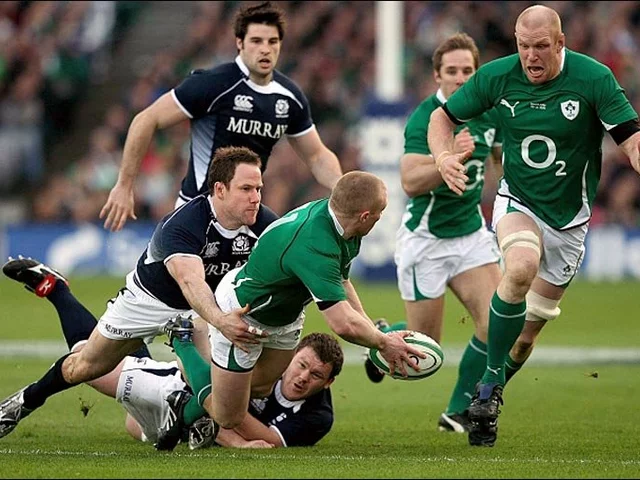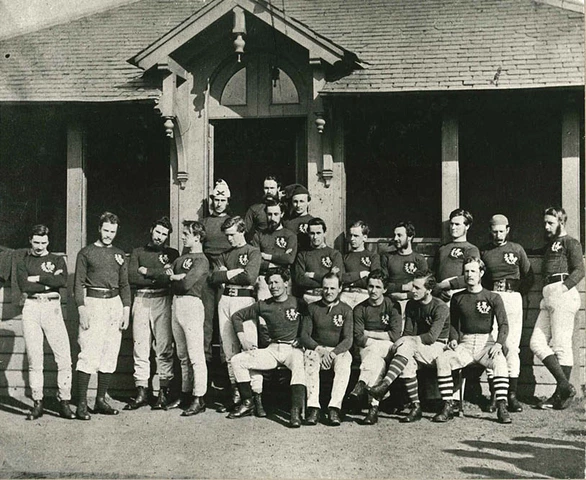A Brief History of Rugby Football
In order to understand why some people call the sport "rugby" instead of "rugby union," it's essential to know the history of rugby football. The sport of rugby football has its roots in the early 19th century, when it was played at the Rugby School in England. This is where the name "rugby" comes from.
Over the years, the sport evolved, and different rules and styles of play developed. Eventually, the game split into two distinct codes, rugby union and rugby league, both of which are played to this day. Rugby union is considered the more traditional and popular form of the sport, while rugby league is known for its faster pace and more open style of play.
As rugby union has its origins in the original rugby football game, some people still refer to it as simply "rugby." However, this can cause confusion, as rugby league is also a popular and well-established sport.
The Differences Between Rugby Union and Rugby League
There are several key differences between rugby union and rugby league, which contribute to the confusion surrounding the use of the term "rugby." Some of these differences include the number of players on each team, the scoring system, and the rules surrounding tackles and possession.
In rugby union, there are 15 players on each team, while rugby league has only 13 players per side. The scoring system also varies, with rugby union awarding more points for certain actions, such as tries and conversions, compared to rugby league. Additionally, rugby union allows for a greater number of tackles before possession changes, leading to a more tactical and strategic game.
As these differences can significantly impact the way each sport is played, it's important to differentiate between rugby union and rugby league when discussing the sport. However, the term "rugby" is often used to refer to both codes, leading to confusion and misunderstandings.
The Influence of Regional Terminology
Another reason why people may call it "rugby" instead of "rugby union" is the influence of regional terminology. In some parts of the world, rugby union is simply referred to as "rugby," as it is the dominant code played in that region. This is particularly true in countries such as England, Wales, and New Zealand, where rugby union is considered the national sport.
In contrast, rugby league is more popular in certain regions of Australia and the north of England. In these areas, rugby league is often referred to as "rugby," which can lead to confusion when discussing the sport with people from other regions.
As the popularity of both codes continues to grow around the world, it's essential to use clear and specific terminology when discussing the different forms of rugby football.
Understanding Rugby's Global Appeal
Rugby's global appeal is another factor that contributes to the use of the term "rugby" to describe rugby union. With the sport gaining popularity in countries where it was previously unknown or underrepresented, the term "rugby" is often adopted as a catch-all phrase to describe the sport.
As rugby union is the more internationally recognized code, it's often the version of the sport that people are first exposed to. This can lead to the assumption that "rugby" is synonymous with rugby union, even if rugby league is also played in that country.
To avoid confusion and promote a better understanding of the sport's different codes, it's important to use specific terminology when discussing rugby football around the world.
The Importance of Clarity in Sports Journalism
Clarity in sports journalism is essential for accurately reporting on and discussing the sport of rugby football. When journalists and commentators use the term "rugby" to describe rugby union, it can create confusion for fans and casual observers alike.
In order to provide clear and accurate information, sports journalists should use specific terminology to differentiate between rugby union and rugby league. This will help to educate fans and promote a better understanding of the sport's different codes, as well as reducing confusion and misunderstandings.
By using clear and specific language, sports journalists can play a crucial role in promoting the growth and development of both rugby union and rugby league around the world.
Educating Fans and Newcomers to the Sport
As rugby football continues to grow in popularity around the world, it's important to educate fans and newcomers to the sport about the differences between rugby union and rugby league. By using clear and specific terminology, fans can develop a better understanding of the sport's different codes and appreciate the unique aspects of each.
This education can take place through sports journalism, as well as through coaching, player development programs, and community outreach initiatives. By promoting a better understanding of rugby union and rugby league, fans can develop a deeper appreciation for the sport and its rich history.
As the sport of rugby football continues to evolve and expand, it's crucial to ensure that fans around the world have a clear understanding of the sport's different codes and can enjoy the unique aspects of each.
Embracing the Diversity of Rugby Football
Ultimately, the diversity of rugby football is one of its greatest strengths. Both rugby union and rugby league offer unique challenges and rewards for players and fans alike, and the differences between the two codes only serve to enrich the sport as a whole.
By using clear and specific terminology, fans can better understand and appreciate the nuances of each code, leading to a greater appreciation for rugby football in all its forms. As the sport continues to grow and evolve, embracing and celebrating this diversity will be essential to the future success of rugby football around the world.
So, whether you prefer rugby union or rugby league, it's important to recognize the unique aspects of each code and celebrate the rich history and vibrant future of rugby football as a whole.



